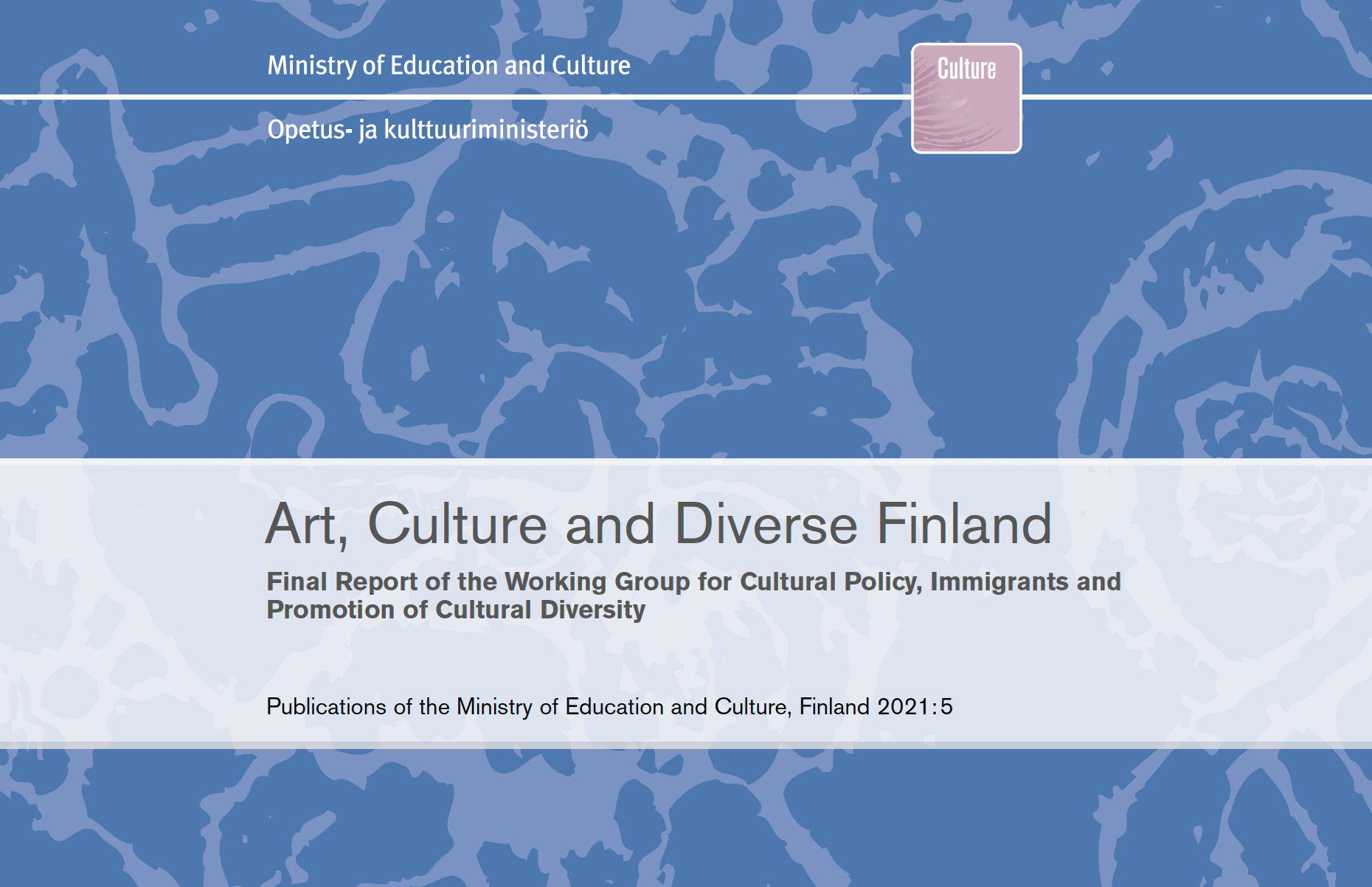
Art, Culture and Diverse Finland. The final report of the Working Group on Cultural Policy, Immigrants and the Promotion of Cultural Diversity
ART, CULTURE AND DIVERSE FINLAND. THE FINAL REPORT OF THE WORKING GROUP ON CULTURAL POLICY, IMMIGRANTS AND THE PROMOTION OF CULTURAL DIVERSITY
The final report of the Working Group on Cultural Policy, Immigrants and the Promotion of Cultural Diversity was handed over to State Secretary Tuomo Puumala on January 20, 2021.
The working group on cultural policy, immigration and cultural diversity was formed on 9 January 2020 to prepare proposals for cultural policy guidelines for the development of the administrative sector. The proposals for cultural policy produced by the working group provide a basis for ongoing dialogue between different stakeholders and increase understanding of their needs and interests. The result of the work of the working group is to contribute to the increase of the participation of the population with a foreign background in cultural life and to the improvement of employment in the field of arts and culture. On the basis of the guidelines, various practical operating models (roadmaps) can be developed, which will enable the industry to move from temporary diversity-promoting projects to a more permanent mode of operation, where cultural diversity is an integral part of arts and cultural organizations.
The final report Art, Culture and Diverse Finland can be found here.
Our Chairperson Ceyda Berk-Söderblom was invited to make a personal commentary on the report during the ceremony. In her speech, Berk-Söderblom highlights the existing discriminatory structures holding up the Finnish culture and arts sectors and much more…
Mr. State Secretary, thank you very much for giving me the floor in this session. It’s my privilege to have been asked to comment on our work. Our report results from a collective vision, as the challenges we have been asked to discuss are too complex for one perspective to address on its own. The report speaks for itself, and Pasi Saukkonen has summarised its main points in his excellent presentation.
What I would like to elaborate on is what this report means to me. Our work has been an organized attempt to improve what is unjust or imperfect in the Finnish arts and culture scene. We challenged norms and aimed at a clear mandate to policymakers for bold action to reduce the existing structure’s inequalities.
The current structure fails to provide equal opportunities to all underrepresented minorities, including foreign-born art professionals in employment, funding, artistic and professional growth. This can no longer be the case.
If people of diverse backgrounds of this country are not yet represented within decision structures of arts and cultural institutions, even to a small extent, we cannot talk about democratic participation.
When the art scene is predominantly governed, created, and distributed by homogenous gatekeepers with very few structures to empower minorities, we cannot talk about social justice. One of the fundamental values of our society, equality, cannot be taken for granted.
The policy recommendations we prepared are clear, specific and realistic. They are not only the collective vision of expertise present in this group but also derived from lived experiences of those who joined us at the workshops and generously contributed to our work. Their voices are front and centre, just as they should be.
In my opinion, what lies at the heart of our work was finding answers to the crucial questions. How to rebuild the art scene that operates with an excellent sense of equity and how do we become a relevant part of Finnish society? And Who is given a chance to contribute to the contemporary narrative of Finnish art?
Our task has not only been demanding but also rewarding. I trust our input calls on policymakers to use the report as an ‘invaluable resource’ for decision-making. As a foreign-born art professional, on behalf of my organization Globe Art Point and the community we stand for, I’m confident that policymakers in the Ministry of Education and Culture will do the hard work of accounting, taking responsibility for implementation of measurable actions and commit to taking concrete steps to advance diversity, equity and inclusion.
The art makers have been and should always be at the forefront of helping society navigate through uncertain times and stimulate change. I firmly believe the Finnish arts and culture scene and my colleagues have the capacity to address deeply rooted reasons for exclusive attitudes and the power to secure fairness for the most vulnerable.
I would like to conclude by taking this opportunity to thank each and every member of this group, in particular our secretariat Maija Lummepuro, Sini Keinonen and our chair Pasi Saukkonen who have truly included me. By overcoming the language barrier during our work, you all made me feel like a valued member of this team, and for that, I am grateful.
Thank you!
Additional information and contacts:
Ceyda Berk-Söderblom, Chairperson of G.A.P, Cultural Manager, Curator
ceyda.berk-soderblom(at)globeartpoint.fi
Contact person at the Ministry:
Maija Lummepuro, Senior Ministerial Adviser, Cultural Affairs
tel. +358 295 330 198
maija.lummepuro(at)minedu.fi